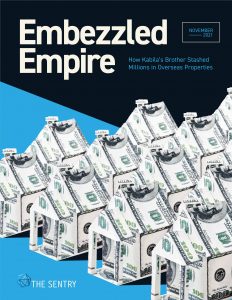 Read the full report
Read the full report
> En français
> Read more from the Congo Hold-up leak
Although President Joseph Kabila’s final term as head of the Democratic Republic of Congo (DRC) was set to end in December 2016, he clung to power and delayed elections for another two years. While the eyes of many observers were fixed on the election stalling tactics in Kinshasa, Kabila’s brother Francis Selemani purchased numerous luxury homes in the United States and South Africa, it appears at least in part using funds diverted from the Congolese government.* At the time, Selemani was managing director of BGFIBank DRC, the Congolese subsidiary of Gabon-based BGFIBank Group.* * Selemani and the Kabila family used a network of companies and the bank they controlled to misappropriate public funds, transferring millions abroad and purchasing millions of dollars in foreign real estate. They moved substantial sums through BGFIBank DRC with little to no resistance. Among the most problematic transactions, according to an internal audit at BGFIBank DRC, were multimillion-dollar transfers involving an obscure company called Sud Oil.*
Congo Hold-Up
Read more from the Congo Hold-up leak
Millions of leaked bank records obtained by the Platform to Protect Whistleblowers in Africa (PPLAAF) and Mediapart and shared with The Sentry by PPLAAF and the European Investigative Collaborations (EIC) network reveal that between 2015 and 2018, Sud Oil sent more than $12 million to accounts and companies owned or controlled by Selemani.* Investigations by The Sentry, Congo Research Group, and other members of the Congo Hold-up consortium, the international group of non-profit organizations and media outlets collaboratively investigating the leak, show that Sud Oil received at least $85 million in funds from a range of Congolese government institutions, including the Central Bank of Congo, the DRC’s permanent mission to the United Nations in New York, the Congolese state-owned mining company Gécamines, and the country’s electoral commission.* At the same time that the $12 million was transiting accounts held by Selemani and companies linked to him and his wife, Selemani purchased 17 properties for a total of $6.6 million in the affluent suburbs of Washington, DC, and Johannesburg, South Africa.*
The Sentry identified a range of irregularities, misrepresentations, and inconsistencies in transactions connected to bank accounts held by Selemani and his companies that are red flags for money laundering and other financial crimes. Funds received from public institutions lacked justification, and the sources of funding for some transfers were misrepresented. Selemani used corporate vehicles that obscured his identity as the owner of all but one of the 17 real estate purchases discovered by The Sentry.* Selemani had originally purchased nine properties in his own name, but he then transferred ownership to a commercial company and to trusts he controlled, including by selling them to his own company, in a series of operations that is a red flag for money laundering through real estate.
Read the full report and recommendations >

